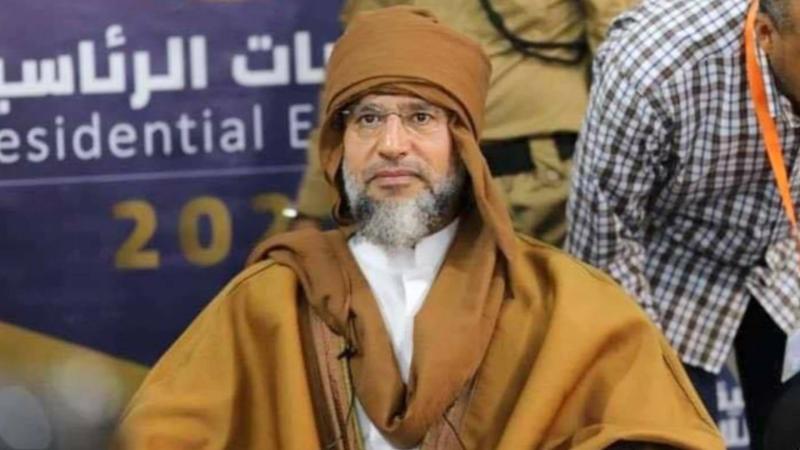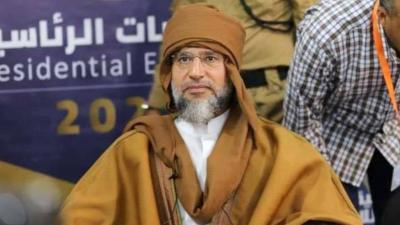Amidst a military display of dozens of armed vehicles in the city of Zintan, west of Libya, political and military forces announced their support for Saif al-Islam Gaddafi to lead the upcoming phase of the country. This development is causing confusion in the Libyan landscape and raises many questions about the implications of this move for the future of the country.
In the midst of a politically unstable environment, compounded by the resignation of the ninth UN envoy to Libya, Abdullah Batili, an armed faction from Zintan surprised everyone by declaring its support for the son of the late Libyan President Muammar Gaddafi. They warned against any attempts to exclude him from the upcoming presidential elections, for which the date and regulations are still not agreed upon.
This marks the first time since the fall of his father's regime that a Libyan military force has declared support for Saif al-Islam. Interestingly, this support emerged from a city that played a significant role in the revolution, where an armed brigade from Zintan was responsible for capturing him in 2011 and imprisoning him for several years before his release in 2017.
The timing of this military, social, and political support is crucial for Saif al-Islam, as discussions around internal and external efforts to permanently remove him from the scene intensify. This has raised numerous questions about its impact on his political stance during this convoluted phase and whether it could position him among influential military forces capable of enforcing their will by force, similar to many other parties.
### Controversial and Surprising Statement
The controversial statement issued in Zintan came from a military force composed of dozens of armed vehicles, as shown in a video accompanying the announcement. They claimed to represent the social, military, and security forces of Zintan, located about 80 kilometers south of the capital, Tripoli.
The participants in the statement warned of the "grave consequences of the series of deception and manipulation of the rights and will of the Libyan people to renew the legitimacy of its institutions and authorities through simultaneous presidential and parliamentary elections, aiming to serve the interests of the dictatorial clique clinging to positions of power and influence."
The social and military forces supporting the statement expressed their backing for Saif al-Islam Gaddafi's candidacy for the presidency. They said he "enjoys significant popular support, possesses leadership qualities, sincere national commitment, and extensive political experience," and emphasized that they would not permit any dubious attempts by some local and international parties to hinder his right as a Libyan citizen to run for election.
### Widespread Support
Following the issuance of the statement in Zintan, several large tribal and social entities quickly voiced their support, many of which are known for backing the former regime led by the late Muammar Gaddafi, such as the Tuareg component and most constituents of the city of Ghat in the southwest, as well as the Warshafana tribes situated on the outskirts of Tripoli, alongside other smaller and less influential components in the south. No other military forces have declared their support for the Zintan armed faction's stance.
Some prominent military figures expressed individual support for the position of the Zintan forces, indicating that the possibility of new military formations joining the Gaddafi camp remains viable, which could shift the balance on both military and political levels. Among the well-known military leaders who sympathized with the statement from Zintan is Nasser Ammar, commander of the support force in the "Volcano of Rage" operation, a large and influential military coalition in western Libya.
Ammar stated, "If Saif al-Islam Gaddafi can unite Libya and restore its sovereignty, then all Libyan cities should rally around him, joined by all segments of the people and all tribes." He added, "This will not stop at the Zintan statement alone, several other statements supporting the man and his right to run in the presidential elections will emerge in the coming days."
### Tensions in the South
These unexpected moves by supporters of Saif al-Islam Gaddafi have caused security tensions in various regions, especially in the south, where some individuals loyal to the former regime have been arrested. Among these arrests was Ali Al-Hassanawi, the head of Saif al-Islam's reconciliation team, which prompted significant protests from the "Green Movement," the term used for supporters of the former regime in Libya.
Saif al-Islam Gaddafi's political team, which issues all his statements, praised the Zintan announcement as expected, confirming their "support for its national content calling for the unification of Libyan efforts to save the country." They endorsed the Zintan forces' call for expediting the holding of simultaneous presidential and parliamentary elections without excluding any party and supported their call for Saif al-Islam's candidacy.
In contrast, his political team condemned the repression, intimidation, and arrests carried out by some security agencies in the southern regions against the local residents, noting the arbitrary detention of Ali Bousbibah Al-Hassanawi.
### A Shift in Balance
The gathering of military forces around Saif al-Islam Gaddafi at this time, which began in Zintan, is viewed by many analysts as a potentially significant shift that could alter many dynamics within the landscape, especially since he has previously lacked such support to strengthen his position in the Libyan scene where military power has been dominant in recent years, especially as armed groups in Tripoli and Sebha had paralyzed the presidential elections to prevent his participation in 2021.
Alternatively, some believe that the actions of Gaddafi’s supporters will only heighten political tensions and deepen divisions within the country, while others maintain that the current movements of the "Greens" are a card being played by external forces to send messages to certain parties both inside and outside the country.




